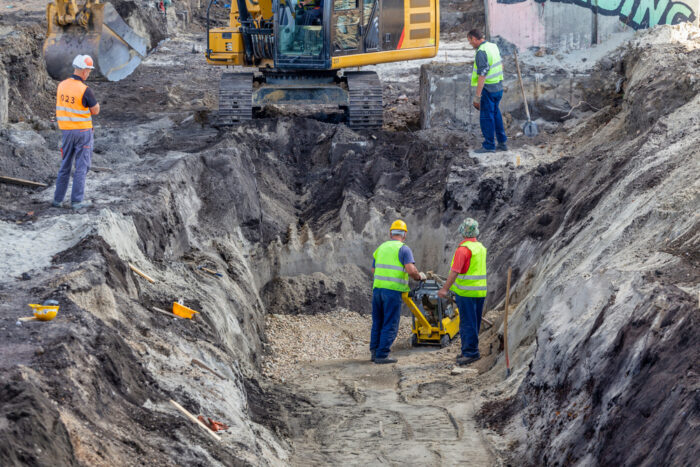Find all related Progressive Post
Progressive Post
The newly released proposals from the European Commission on the circular economy broaden the scope of product governance and design. They provide an opportunity to move towards a holistic assessment that takes the entire product life cycle into account. The sustainable product initiative in particular provides an opportunity to increase the scope of an integrated approach to the circular economy that has already been pioneered in areas like the regulation of batteries to all kinds of products.
In a global context, the scarcity of resources – from fresh water to fertile land – endangers the quality of life of future generations. Today, the equivalent of 1.7 planets are used, with global consumption of material resources increasing 14 times between 1900 and 2015. This figure is projected to still more than double between 2015 and 2050.
We understand, therefore, how the transition towards a low-emission circular economy must become both a European and a global priority. In addition to the environmental pressure, more than 90 per cent of the loss of biodiversity and the stress on water comes from resource extraction and processing. This situation represents a serious challenge for the EU economy and its industrial sector, which is heavily dependent on both energy and materials from international markets. Implementing circular economy targets will decrease our supply dependency from countries outside the EU; they could tackle price volatility and empower industrial competitiveness.
The green transition will free us from our dependence on imports of energy and other resource. And the circular economy, through the use of secondary raw materials, will allow us to reduce our energy demand for extraction and production, compared to using virgin raw materials. Currently, with the pandemic fading and the conflict raging in Ukraine, the need to work together towards a sustainable future is more pressing than ever before, as we are running headfirst into the limits of what our planet can provide.
Today, the European Green Deal aims exactly at boosting this transition through a set of actions based on a sustainable, climate-neutral economic development that is capable of ensuring a socially just transition. In this context, the circular economy can be a fundamental leverage to achieve strategic autonomy for the European Union. Consequently, it is particularly significant that the European Commission has updated its action plan on the circular economy by defining measures and actions which are to be implemented during this mandate. In the previous version of the action plan, concentrated on the end of life of products, ambitious targets for recycling and reducing landfilling were set, whose implementation is to be monitored by the European Commission. Now, however, the focus must shift to preventing the production of waste.
In March this year, the European Parliament adopted its position on the new battery regulation. It lays down, for the first time in European legislation, a holistic set of rules to govern an entire product lifecycle, from the design phase to end-of-life. This creates an entirely new approach to boosting circularity.
Sustainability criteria such as the carbon footprint threshold, minimum recycling content, durability and performance requirements and removability criteria are fundamental standards to create a benchmark for the entire global market and to enhance resource efficiency. Currently, however, there is no comprehensive set of requirements to ensure that all products placed on the EU market become increasingly sustainable and that they stand the test of circularity. As a result, products are frequently replaced, which involves a significant use of energy and resource to produce and distribute new products and dispose of old ones.
The new legislation on sustainable products will represent a new European approach towards product policy. It will have to broaden the approach used for batteries into wider, horizontal rules. The initiative will review the scope of the ecodesign directive to be widened beyond energy-related products, and made applicable to the broadest possible range of products. Standards for performance, durability, reusability, reparability, non-toxicity, upgradability, recyclability, and recycled content should become the norm for products in the EU market rather than the exception.
These standards will complement the energy efficiency measures covered by the current ecodesign directive and it will help achieving the reduction by 55 per cent of the EU’s greenhouse gas emissions by 2030.
As European Socialists and Democrats, we want to allow companies and consumers to compare the environmental footprint of different products. A product passport will be a crucial tool. It will have to provide accessible information about the durability of the product and its maintenance, reuse, repair and dismantling possibilities and end-of-life handling as well as its composition in terms of materials. Consumers must get the most complete and trustworthy environmental information. They must be protected against greenwashing, and they must obtain new rights such as the right to repair products.
Today there are more than 200 environmental labels used in the EU. Worldwide, there are more than 450. But while some of these are reliable, others are not. It is still difficult for consumers, companies and other market actors to make sense of them all. At the same time, European Commission will have to continue to supplement the legislative framework with specific products regulation. I refer in particular to the upcoming revision of the packaging and packaging waste directive or new ICT legislation.
As a political group, we have always been at the frontline to push for a robust transition towards a circular economy. We have been asking for mandatory resource efficiency requirements since the first circular economy action in 2014. Now, the sustainable product initiative (SPI) is a first milestone in this direction. Nevertheless, I believe we should strengthen this proposal by proposing binding EU targets for 2030 to significantly reduce the EU material and consumption footprints and bring them within planetary boundaries by 2050. This will enable a pathway to true circularity in the way we produce and consume.
The transition towards a circular economy has always been a flagship for European Socialists. We will continue to fight for it while assuring that this transition will unfold in a social and just way.
Photo credits: Hyper Story/Shutterstock.com
| Cookie | Duration | Description |
|---|---|---|
| cookielawinfo-checkbox-advertisement | 1 year | Set by the GDPR Cookie Consent plugin, this cookie is used to record the user consent for the cookies in the "Advertisement" category . |
| cookielawinfo-checkbox-analytics | 11 months | This cookie is set by GDPR Cookie Consent plugin. The cookie is used to store the user consent for the cookies in the category "Analytics". |
| cookielawinfo-checkbox-functional | 11 months | The cookie is set by GDPR cookie consent to record the user consent for the cookies in the category "Functional". |
| cookielawinfo-checkbox-necessary | 11 months | This cookie is set by GDPR Cookie Consent plugin. The cookies is used to store the user consent for the cookies in the category "Necessary". |
| cookielawinfo-checkbox-others | 11 months | This cookie is set by GDPR Cookie Consent plugin. The cookie is used to store the user consent for the cookies in the category "Other. |
| cookielawinfo-checkbox-performance | 11 months | This cookie is set by GDPR Cookie Consent plugin. The cookie is used to store the user consent for the cookies in the category "Performance". |
| csrftoken | past | This cookie is associated with Django web development platform for python. Used to help protect the website against Cross-Site Request Forgery attacks |
| JSESSIONID | session | The JSESSIONID cookie is used by New Relic to store a session identifier so that New Relic can monitor session counts for an application. |
| viewed_cookie_policy | 11 months | The cookie is set by the GDPR Cookie Consent plugin and is used to store whether or not user has consented to the use of cookies. It does not store any personal data. |
| Cookie | Duration | Description |
|---|---|---|
| __cf_bm | 30 minutes | This cookie, set by Cloudflare, is used to support Cloudflare Bot Management. |
| S | 1 hour | Used by Yahoo to provide ads, content or analytics. |
| sp_landing | 1 day | The sp_landing is set by Spotify to implement audio content from Spotify on the website and also registers information on user interaction related to the audio content. |
| sp_t | 1 year | The sp_t cookie is set by Spotify to implement audio content from Spotify on the website and also registers information on user interaction related to the audio content. |
| Cookie | Duration | Description |
|---|---|---|
| CONSENT | 2 years | YouTube sets this cookie via embedded youtube-videos and registers anonymous statistical data. |
| iutk | session | This cookie is used by Issuu analytic system to gather information regarding visitor activity on Issuu products. |
| s_vi | 2 years | An Adobe Analytics cookie that uses a unique visitor ID time/date stamp to identify a unique vistor to the website. |
| Cookie | Duration | Description |
|---|---|---|
| NID | 6 months | NID cookie, set by Google, is used for advertising purposes; to limit the number of times the user sees an ad, to mute unwanted ads, and to measure the effectiveness of ads. |
| VISITOR_INFO1_LIVE | 5 months 27 days | A cookie set by YouTube to measure bandwidth that determines whether the user gets the new or old player interface. |
| YSC | session | YSC cookie is set by Youtube and is used to track the views of embedded videos on Youtube pages. |
| yt-remote-connected-devices | never | YouTube sets this cookie to store the video preferences of the user using embedded YouTube video. |
| yt-remote-device-id | never | YouTube sets this cookie to store the video preferences of the user using embedded YouTube video. |
| yt.innertube::nextId | never | This cookie, set by YouTube, registers a unique ID to store data on what videos from YouTube the user has seen. |
| yt.innertube::requests | never | This cookie, set by YouTube, registers a unique ID to store data on what videos from YouTube the user has seen. |
| Cookie | Duration | Description |
|---|---|---|
| COMPASS | 1 hour | No description |
| ed3e2e5e5460c5b72cba896c22a5ff98 | session | No description available. |
| loglevel | never | No description available. |


